With natural and organic grocers sprouting up everywhere and giving both investors and shoppers a broad assortment of supermarket alternatives to choose from, Whole Foods Market (WFM +0.00%) finds itself under increasing pressure to combat slowing sales growth.
Struggling to combat inroads that new entrants such as Sprouts Farmers Market (SFM +0.33%) are making on its turf, Whole Foods saw its same-store sales rise less than 6% in the organic grocer's fourth quarter, its slowest rate in nearly four years. In contrast, Sprouts saw pro forma comps surge 10% year over year, leading to a 24% increase in total sales from the year-ago period.
So to help keep them coming back for more, Whole Foods is now testing a discount loyalty card program -- the first time it has resorted to such tactics, and a recognition that despite offering a discounted line of private-label goods under its 365 Everyday Value brand, the grocer has never really shaken the "Whole Paycheck" pejorative it's been saddled with. The loyalty card, therefore, is designed to introduce shoppers to the store brand, though there are no plans to take it national just yet.
Supermarkets and other retailers use the treasure trove of personal data contained in those plastic cards you swipe at the beginning of your checkout procedure to target their marketing and pricing. In exchange for a few pennies off milk and eggs, for example, customers willingly give up incredible amounts of personal and private marketing and behavioral information.
Like Google (GOOG +1.09%), using its AdSense program to scan your emails and search history to deliver tailored advertising to your desktop, retailers can keep track of underlying shopping patterns that could be worth big money.
Yet supermarket chain Albertson's created a stir earlier this summer, when it opted to end its loyalty-card program, arguing that individual preferences matter less than neighborhood shopping needs. That went against the grain of other chains with loyalty-card programs, such as industry leader Kroger (KR 0.60%), which recognized the value of private-label brands early on.
At the time I said Whole Foods didn't have such need for such Big Brother databases, but as re:invention consulting's president, Kirsten Osolind, commented, they do indeed collate such valuable customer information -- she helped design the grocer's database -- but gathered it through its gift card program and a store newsletter .
The organic grocer is also glomming on to another trend that's sweeping the retail market -- ship-to-store, in which customers shop online and pick up the items in-store. Whole Foods will be launching a "click and collect" system that lets shoppers in certain markets order groceries online and then head to the store to pick them up.
It generated 12% of its $12.9 billion in total revenues this past year from its exclusive brands (up from 11% a year ago), half of which are its 365 and 365 Organic Everyday Value products (the other half comes from producers such as Wellshire Farms that agree to exclusively provide product to the chain). So it's smart that Whole Foods wants to mine this niche further, as private-label goods carry higher margins than brand-name goods and have even led to the creation of "premium" off-brands such as Walgreen's Nice! and Target's Archer Farms.
Coupled with the in-store pickup of groceries, Whole Foods just might be able to tap a whole new trove of information that can lead it to mine additional opportunities for growth and find renewed loyalty from its customers.






